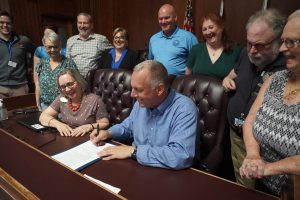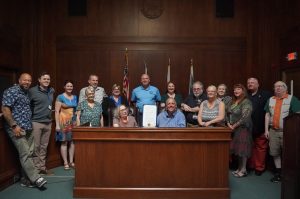Pawtucket, RI — September 16, 2024 — The City of Pawtucket has proudly taken a major step towards becoming an Age-Friendly Community, a worldwide effort led by the World Health Organization and AARP. On Monday, September 16th, 2024, Mayor Donald R. Grebien officially signed a resolution, marking the beginning of this important process. The signing ceremony took place in the City Council Chambers and was attended by local leaders, community and state advocates, and members of the Pawtucket Senior Citizens Council.
This initiative, which has been in the works for over six years, was recently approved by Pawtucket’s City Council. The resolution is a testament to the City’s commitment to creating a more inclusive and supportive environment for not only its older residents but also the very young and everyone in between.
Mayor Donald R. Grebien expressed his enthusiasm for the milestone, stating, “Today’s signing of the AARP resolution represents a significant achievement for Pawtucket. This process has been many years in the making, and we are thrilled to finally reach this pivotal moment. I want to extend my heartfelt gratitude to all the individuals who have played a crucial role in this journey. Pawtucket is a diverse city that embraces all cultures, orientations, and races. This resolution brings us one step closer to ensuring that every resident, regardless of age, feels valued and supported in our community.”
“This initiative has been a labor of love for many years, and it is incredibly rewarding to see it come to fruition with the support and backing of so many leaders. Now the real work begins,” said Mary Lou Moran, Director of the Leon A. Mathieu Senior Center, Pawtucket Division of Senior Services. “Becoming an Age-Friendly Community will enhance the quality of life for our older adults and make Pawtucket a place where everyone can thrive.” She added, “September is National Senior Center Month. This was perfect timing to advance this initiative during Senior Center Month.”
Some of the areas that will be looked at include the World Health Organization’s recommended domains of healthy community life, including outdoor public spaces and buildings, transportation options, housing options, civic participation and social inclusion, as well as health services and community-based supports.


